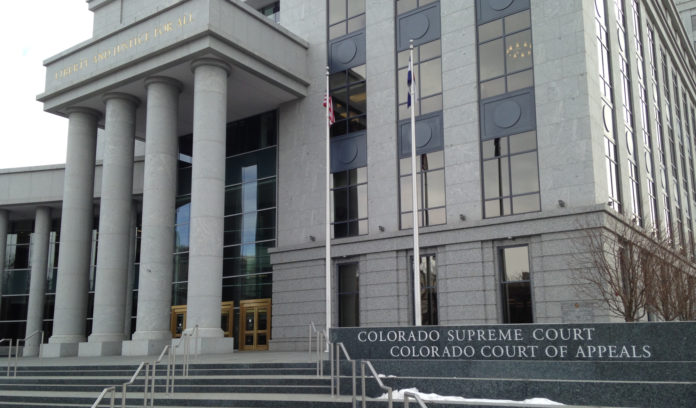
Editor’s Note: Law Week Colorado edits court opinion summaries for style and, when necessary, length.
Antero Treatment LLC v. Veolia Water Technologies
In this post-trial original proceeding, the Colorado Supreme Court considered petitioner Antero Treatment LLC’s assertion that the $25,000,000 supersedeas bond cap set by Colorado Revised Statute section 13-16-125(1) is unconstitutional. The Colorado Supreme Court concluded the statute doesn’t unconstitutionally infringe on this court’s rulemaking authority as exercised in the Colorado Rules of Civil Procedure 121, section 1-23(3)(a). Nor does it violate equal protection principles. It also concluded the trial court didn’t abuse its discretion by refusing to order respondent, Veolia Water Technologies, Inc., to provide post-judgment discovery or security beyond the $25,000,000 supersedeas bond. The Colorado Supreme Court discharged the rule to show cause.
After a fifteen-day trial, the trial court awarded Antero $280,105,869. Those damages resulted from breach-of-contract and fraud claims based on Veolia’s failure to complete and commission a wastewater treatment facility for natural gas extraction, the opinion explained.
Veolia appealed. To stay the execution of judgment while it appealed, Veolia filed a $25,000,000 bond with the trial court. Veolia maintained that $25,000,000 was the maximum bond amount permitted in Colorado under the statute.
Antero disagreed. It asserted the rule requires Veolia to post a bond for 125% of its judgment. In support of this argument, Antero contended the legislature’s bond cap is unconstitutional because it clashes with the rule’s 125% directive, which Antero sees as a procedural matter the judiciary controls. Antero also sought additional security and post-judgment discovery to investigate whether Veolia was moving assets to evade the judgment.
Veolia responded by defending the statute’s constitutionality, but it also pointed to a guarantee, which its parent company Veolia France had entered years earlier, the opinion noted. The guarantee stipulated Veolia France would “indemnify and pay” Antero for any breach of the contractual obligations at issue here. Veolia also presented an affidavit from the CEO of Veolia France stating, “I hereby reaffirm that this legally binding obligation continues to be in full force and effect.”
Lastly, to address Antero’s concern about Veolia’s assets, Veolia noted the CEO’s affidavit reassured Antero that “[n]either Veolia nor Veolia France is presently diverting, dissipating, hiding or otherwise disposing of assets to avoid paying the judgment.” Antero countered that these unsecured pledges were woefully inadequate to protect such a large judgment.
The trial court deemed the statute constitutional. The court determined the statute and rule didn’t conflict and concluded the statute concerned substantive matters within the legislature’s purview. The court also denied Antero’s request for additional security and discovery.
Antero filed a C.A.R. 21 petition, and the Colorado Supreme Court issued a rule to show cause.
The Colorado Supreme Court began by addressing its exercise of original jurisdiction. It then identified the applicable standard of review and revisited familiar principles of statutory interpretation before turning its attention to the core substantive questions: whether the statute violates the separation of powers, whether the statute violates equal protection requirements and whether the trial court otherwise abused its discretion.
After evaluation, the Colorado Supreme Court discharged the rule to show cause and remanded for further proceedings.
In this C.A.R. 21 proceeding arising out of an underlying child welfare case, the Washington County Board of County Commissioners and the Washington County Department of Human Services, referred to collectively as the “County,” contended the district court had no jurisdiction to grant a non-party, the Office of the Child Protection Ombudsman, access to an unredacted workplace investigative report commissioned by the BOCC. The report concerned allegations of workplace misconduct by DHS’s former director and referenced the parties involved in the underlying child welfare case, the opinion noted.
After rejecting the Ombudsman’s and the district court’s contention that the issues raised in this case are moot, the Colorado Supreme Court concluded the district court lacked subject matter jurisdiction to order the BOCC to release the report to the Ombudsman because the court’s jurisdiction terminated before it issued its orders and the court didn’t retain ongoing jurisdiction to issue such orders.
The statute outlining the duties and authority of the Ombudsman doesn’t authorize the Ombudsman to file a motion seeking information in a case in which it’s not a party but rather, to obtain such information, the Ombudsman must comply with the Colorado Open Records Act, and the Ombudsman had no right to obtain the full, unredacted report, most of which addressed matters beyond the scope of the Ombudsman’s jurisdiction, the opinion explained.
The Colorado Supreme Court made its rule to show cause absolute and ordered the Ombudsman to destroy or delete all copies of the unredacted report in its possession, custody or control, including all paper and electronic copies and to provide a certification to the County within fourteen days of the date the mandate issues in this case verifying that it has done so.
After evaluation, the Colorado Supreme Court concluded the district court lacked subject matter jurisdiction to enter the orders compelling production of the unredacted Report in this case, the Ombudsman doesn’t have the statutory authority to access information relating to an investigation by filing motions in cases in which it’s not a party but rather must proceed in accordance with CORA, and even if the district court had jurisdiction here, the Ombudsman had no right to obtain the full, unredacted report, most of which addressed matters beyond the scope of the Ombudsman’s jurisdiction.

